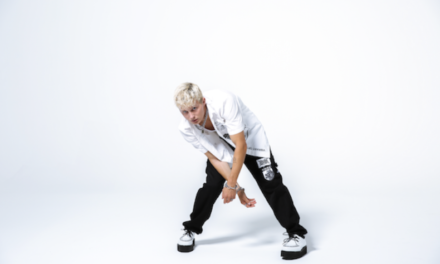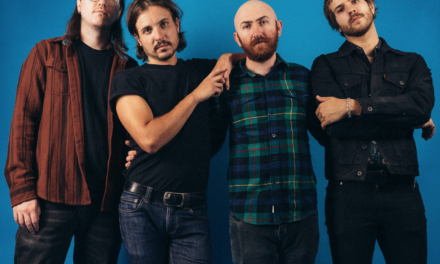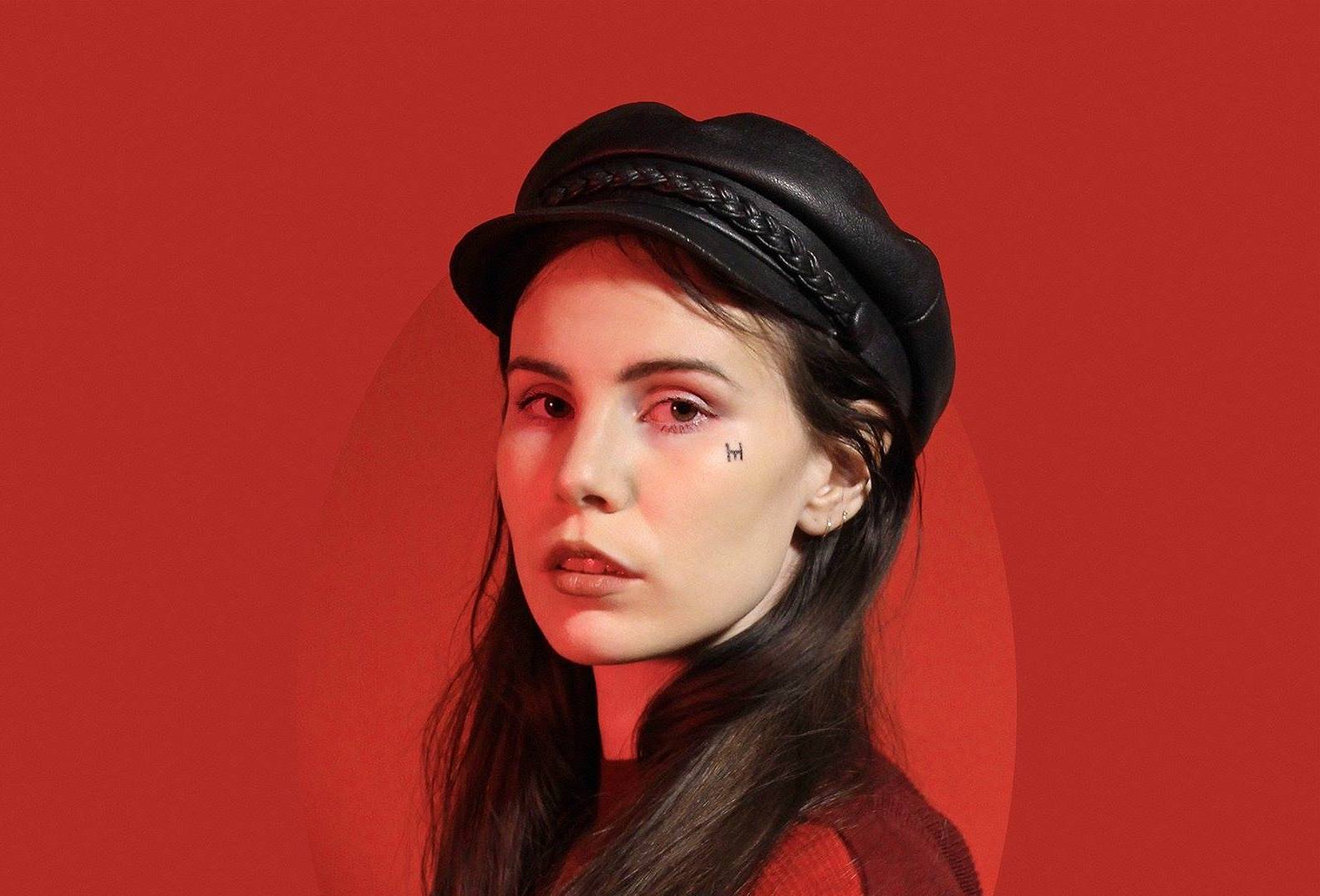Lead Photo Credit: Brantley Gutierrez
The only constant in life is change. It’s unavoidable. It’s a both fulfilling and painful process. The shedding of things that you’ve endured and fighting for the things that make you whole. It’s a war. As many musicians share their struggles and triumphs with change, it’s a reminder that it’s a process that everyone goes through.
Take Me to the Disco–the first album release in three years from Meg Myers–is an honest and brave narrative of her own journey into defining herself. Her departure from Atlantic Records, where she created her well received debut, 2015’s Sorry, and rediscovering herself on a personal and musical level lead Myers up to this point. Her sophomore album is one of ambition and self-healing. We caught up with Myers to have a revealing conversation about the album, specific songs, and what Take Me to the Disco means for her.
Substream: Just to begin, how are you now? It’s been a little bit. Since your debut album and just in life in general?
Meg: I’m doing really good. I have definitely been through a lot in the past few years and there has been massive growth and change. After that record, I moved to Nashville for a few years and kind of just checked out in the country. I just got burned out pretty quick touring on that record even though it wasn’t that long. I didn’t really know what I wanted to do completely. I still wanted to do art – I just didn’t know what and how. I went through a change with my label- that was pretty recent, but I was always going through that. You know, if I was going to stay on that with them and if they were going to keep me.
I basically started writing a bunch of songs and did a lot of personal work on myself. Individual, self-help, therapy type stuff. A couple of years ago, I found my producer, Christian “Leggy” Langdon and we started working together, which changed everything for me. It’s crazy how you can find somebody and just be so inspired. We just come from similar backgrounds musically and just clicked. I wrote with a few other people. There are a couple songs on the album that I wrote with other people, but he produced the whole thing and we wrote most of it together. He kind of showed me a new way and I think that he pulled a lot of things out of me. I thought that I went deep on the first album, but this one, I feel like I went so much deeper into myself.
I was doing a lot of self-discovery through the process of this record. There was a lot of things coming up for me that I never had come up for me before. It’s been a long spiritual journey for me, I will say. The album is really connected in that way where I express somethings that I was maybe scared to do before. It was cool to do that in a dark musical way. There’s a lot of darkness on this album, but there’s a lot of..I don’t know if hope is the right word. A lot of light and dark. It’s somehow all integrated. There’s a lot of parts of myself that I shut down for a lot of my 20s. Christian really helped pull out all the things I was afraid to address for so long.
I know that you’ve mentioned that with Sorry, you go from “Motel” to “Feather”. “Motel” is darker and the album gets progressively hopeful getting to “Feather.” Take Me To The Disco is a journey as well. Going up into it you get to “Constant,” which is an acoustic track. To me, the album is a microcosm of what we are going through now. A state of perpetual shock. You wonder if you’re the only one going through the darkness. Is that the lesson you were trying to get with this album? Not that it’s all dark, but there’s hope in that we are living in shared experiences together?
I think I wasn’t writing the songs having that in mind. I think a big part of my experience in the past couple of years was…I became obsessed with wanting to escape for a long period of my life. Struggling with depression and anxiety. Wanting to just fucking disconnect. Throughout the making of the record and getting to know Leggy and our whole journey, I started discovering that what I wanted my whole life was to connect. To connect with myself and people on a deeper level. To be able to be real and vulnerable.
That is something that is expressed so much on this record. That honesty and that vulnerability. That’s the thing. Let’s all just be real with each other. It’s a scary thing to open that part of yourself and admit these things. Something that I’ve been discovering myself a lot in the past year is how much I project and how much we all do that onto one another. I think all of these things that I’ve been learning are expressed. Also, some of the songs I wrote with Leggy, he was going through some stuff too. There’s a nice collaboration. “Take Me To The Disco” is one of them.
Going to “Take Me To The Disco.” It’s our introduction on the new album and the second song you released. You are even more musically ambitious as you go through. It starts on a note lyrically where you are left at the dance floor. You’re waiting for something. That theme goes throughout the album. I know on a surface level, it could be about love, but there has to be a deeper meaning to you as well. How did you want to introduce those themes?
When I started writing that song, that was the first song we wrote for the album. The first song we wrote and the last song we finished. It’s crazy. When I was writing, I had a fiancé at the time. We were going through a bad breakup and I thought that I was writing about love in the beginning of it. Also, there are a few different feelings because we are complicated human beings. It’s not just one subject. I think there’s multiple layers. There were feelings about love and feelings about wanting to escape.
As we continued to work on the album and then we went back and finished that song, “OMG, I wasn’t writing about love!” I was writing about wanting to get to know and connect to myself. Also, the realization in the end that all you have is you. It’s a self love song. It’s not that no one is going to be there for you, but you have to be there for yourself, first and foremost. That could be a painful process. It is still. There are ups and downs with that feeling. That’s why we called it “Take Me To The Disco.” It was cool that you caught onto that because it does represent the whole album for me.
There’s a lot of subjects on the album that..how do I say it? There are a lot of struggles in this and that. I didn’t know I was expressing things until I went back and listened to the album later on. There are a lot of songs on the album and songs that I’m going to release a little time after that took on way deeper meanings. You sit and write lyrics in a stream of consciousness and then you go back a few months later after you’ve been through some shit. I’ve been uncovering stuff about myself and my childhood. I might not know what I’m writing about at the time, but then you listen and say, “yep, it was that.”
Listening to the album, there are definitely layers. Listening to a song like “Jealous Sea,” the 808’s and strings throughout the song work to heighten the anxiety. There’s also something cool that you do at the end where you distort your voice. I took that as a person who are trying to fight these demons within themselves and figure out what they are.
That was an interesting one because I wrote that one a long time ago in Nashville when I was alone when I had a fiancee and he was on the road. I was just sitting with an acoustic. It was actually a folk song, originally. It was a lot more folky and way more uplifting sounding even though it’s sad lyrically. That was when I was confused where I wanted to go sonically.
I had a feeling about that song. I always loved it, but it just never really made sense musically. When I brought that to Leggy, he took it to that direction. Almost that Nine Inch Nails direction. It was really, really personal when I wrote that and it was really painful. I’ve struggled with jealously for a long time. It’s something that I’m starting to learn. Like the projection we talked about, when somebody does something, it’s not like they did something to you. It’s that they trigger you and they trigger something deep inside of you. That thing inside of you is coming from something else and not necessarily that person. I’ve been working on that and it’s fucking hard.
That song is expressing that and what that is. Also, I’m not sure if you’re into astrology – my Venus is in Scorpio and I was just having this conversation with my friend. I have a lot of Scorpio. I have quadruple Scorpio on my chart. I’m not trying to justify it, but it’s like, shit, it’s my chart. I’m going to have to work through this. It’s this thing with love that’s very extreme for me. It’s so romantic and passionate and of course, the other side of that. The pendulum swings – it’s like the darkest thing ever. I struggle with that a lot in love and relationships. In my moods and myself. It’s all of that stuff combined in that song.
One of my favorite songs on the album touches on what we just talked about. It’s “Funeral.” There’s a lyric that you say, “I’ll hit you when you’re down on one knee/I’ll give you my heart when I’m six foot deep.” So it goes into that dichotomy that I love intensely, but there’s a flip side to that.
It really is the light and the dark. My life has been very extreme where I would really like to get to that middle place if that is possible. Right now, I’m so raw because I’ve uncovered that and I’m aware of it now. It’s just bare. That song “Funeral,” it’s a painful song, even though it’s also tongue in cheek. It’s like, “I’m crazy, but I’m not! I’m not! I’m a human.”
I wanted to get into “Numb.” It was the first single. You had mentioned that you left your previous label, Atlantic and now you are at 300 Entertainment. That song deals with your time at Atlantic Records. Since your time away, the music industry has changed. A lot of artists are electing to go the indie route because there is more freedom in that. While “Sorry,” is a great album, it seems like there is even more freedom with “Take Me To The Disco.” This is 100% Meg Myers.
That’s a really good question. I’ll just be honest – it was hard. It was really difficult. I didn’t know myself. Not that you ever do. I was really influenced by everything around me. I was also trying to maintain who I thought I was at the time. I think I did the best that I could in that situation. However, there were some really grueling moments for me in that “Sorry” process. I feel for other artists that go through that. It’s tough, but it also gives you some perspective.
I am nothing but grateful for going through all of that. Shit, I have some PTSD from time to time. It was also beautiful. I still love some of the people there. Everybody is trying to do what is best for them and the artists. Nobody is trying to screw you over at these places. Everyone wants the best for themselves and everyone else. Unfortunately, it’s a bit of a shit show on some of those labels.
An artist is complicated. An artist isn’t one thing. An artist can’t be put in a box. That’s what happens at those places and that’s what they are trying to do. That’s something that – I was questioning myself at times. Something inside of me was like, “just keep being yourself.” What that means to me is always evolving. Always doing the things that I feel like doing and that could change from day to day. I think that was confusing for everyone. “What is she?” Now, I feel completely free. I think it was a good decision for both of us because they were willing to let me go. I feel – “free” is the best word, for sure.
I also wanted to touch on the video for “Numb.” When I watched it the first time, I felt like it was a really important moment. Clara Aranovich directed it. I feel that video can only be done the right way from a female perspective. Especially, with the song. There are two meanings to the video. One that we touched on and being a women and having your boundaries constantly violated. How important was it to have this video and make that statement?
I feel really proud of the way we were able to pull it off in a way that speaks for women. It speaks in a way without being totally “man-hater.” I feel so good. It’s a little scary speaking up sometimes. Whether it be music or whatever art you’re doing. It’s scary because there are these issues and you want to show them with your talent. I’m not going to get up and be a speaker about it, but I have feelings about these things and I want to speak through my art.
That was definitely a little scary. After the end result, I was really proud that we were able to give a voice for people and it not only be for women. I know a lot of guys that it’s really affected. It’s speaking of “yes, I am a women but I’m also a human.” I like that we made it really relatable in that way and made it where people could see it on an even broader level. Myself and Clara, both being in the industry, we’ve gone through a lot of stuff and clicked on a lot.
Now, there’s a huge, needed conversation about mental health going, especially with art. You touch on this topic with Sorry, there’s a lot more revealed on this current album. Especially with a song like “The Death of Me.” where it’s your speaking against a male voice. You can interpret that as somebody speaking to you, or I took it as your conscience speaking. Two different parts of you. How nerve racking is it to show those sides of yourself throughout the albums and the EPs that you aren’t perfect? That you are still working through things.
It’s scary, for sure. I feel that if you are vulnerable then that’s amazing. I feel like when I’m writing a song, that’s going to be translated in a positive way. If I’m having a heartfelt moment with it, it may not be for everybody, but there are going to be people who connect with it because it’s from your heart. That song is one of the more mental health oriented ones.
Leggy and I, when we wrote that, I was originally going to sing it. There was something about it that didn’t make sense. I don’t even think we really had the discussion of what it was. It just made sense to do it this way. Like “You have to sing this. You have to do this with me.” There was a bit of push back from him a little bit and I was like “c’mon! You’re doing it. You’re singing it. Sing low.”
When he recorded it, it was like “oh my god.” It could be two people talking to each other, but I think you’re right. I think it’s a person and this other part of them speaking. That song is one of the ones that goes super dark, but positive at the same time.
That’s the human condition. You touched on it early on, but you have to embrace the light in the dark. Listening to Take Me To The Disco, there’s a yin and a yang. Musically, in six of the songs, you added a strings section. It added a lot of atmosphere and brevity. Nine Inch Nails is one of my favorite bands and with every listen, you get something different. Just like this record. How did it feel adding more layers?
It was so awesome. I wanted it on the first record, but I don’t think we could afford it. That was something I always wanted to do. Leggy and I were listening to a lot of classical music for this album. We were making playlists for each other. I was super inspired to get a lot of strings. He did a really good job with it.
We got a quartet to play on the album and that whole process was a couple days. You’re sitting in there and I just had chills. It is such a huge difference than programs, I can’t believe it. I mean, I can, but it’s just human touch. With strings, it’s just something that happens to you physically. It added an enormous amount of emotion to those songs. I really believe that.
You mentioned that you have some extra songs that didn’t make the album. Do you have any concrete plans to release them?
We don’t have any concrete plans. I was hoping to release them one at a time or in a little bundle. We haven’t figured it out yet.
This interview had been edited lightly for clarity.













